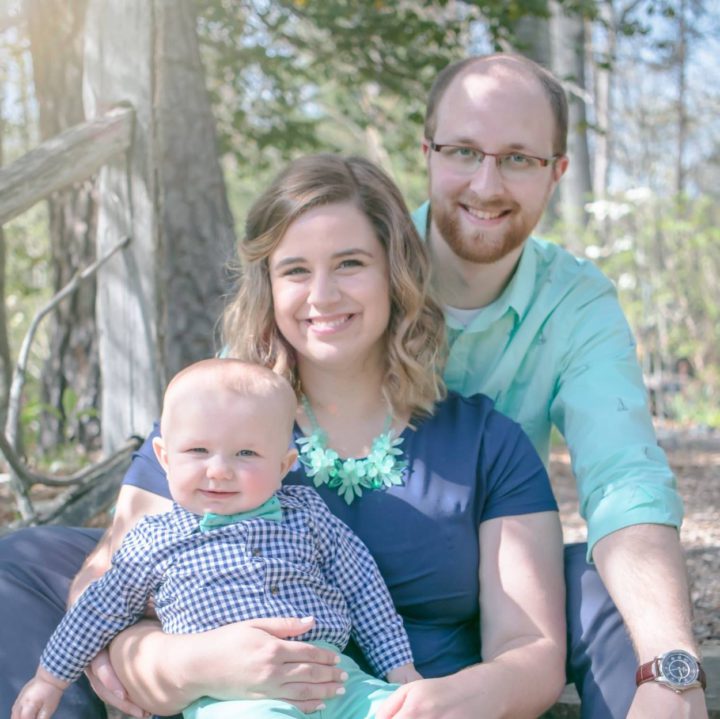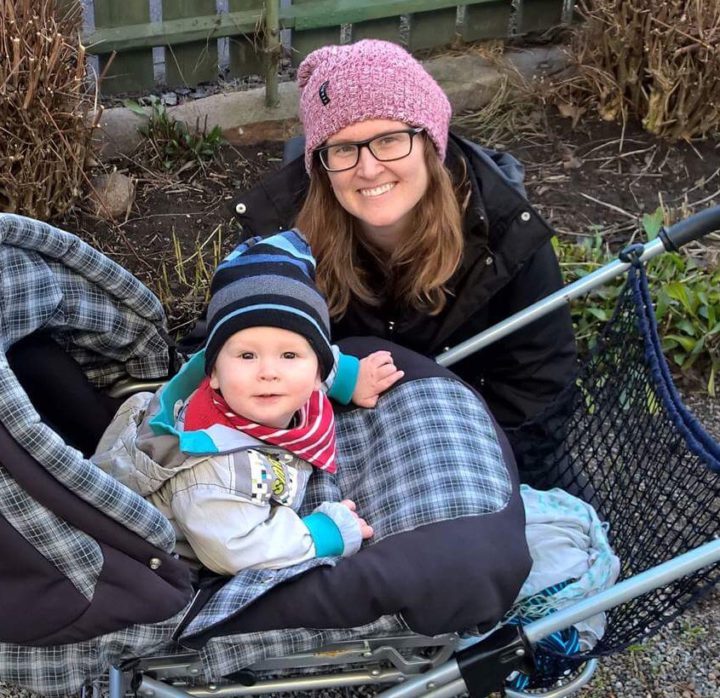If there’s one question people love to ask new parents, it’s this: How’s the baby sleeping?
You aren’t normally a cynical person, but because you haven’t slept for more than two consecutive hours in nearly three weeks you’re suddenly convinced a smirk flashed across the questioner’s otherwise earnest expression. The world, you’re now certain, thrives on schadenfreude.
Of course, nobody is rooting for a sleepless household. And though the answer seems obvious (“Do you not see the bags under my eyes?!?”), you eventually come to understand this frequently asked question is a coverall. What your neighbors, co-workers, family members and friends are actually asking you is this: “How are things going and are you OK?”
In the moment, you’re tired. But that’s to be expected. When it comes to newborns, everyone knows the evenings are long. They have to be. “A small infant isn’t supposed to sleep through the night,” explains Dr. Lauren Keely Carlisle of French Broad Pediatrics. A baby’s small stomach, Keely Carlisle continues, requires frequent feedings.
For this reason, most newborns won’t experience a full-night’s sleep until the three-month mark. However, this breakthrough isn’t a guarantee. And for some local parents who spoke with Xpress, the 90-day milestone came and went unnoticed during a string of sleepless nights. Desperate, they took to the internet for solutions. In the process, some discovered new callings as actual sleep consultants, doing what they could to help fellow parents and their newborns find some much needed shut-eye.
Inspiration in wee-wee hours
On Jan. 11, 2016, Kim Rogers gave birth to her son Julian. He arrived four weeks early. Soon after his delivery, Julian was diagnosed with gastroesophageal reflux disease, commonly referred to as GERD. As a new mother and solo parent, Rogers spent the first few weeks of Julian’s life in the neonatal intensive care unit at Mission Hospital.

“I was sleep-deprived and trying to get a milk supply going,” Rogers remembers. “On an emotional level, I felt severe stress and isolation.”
Things settled down for a brief period after leaving the hospital. During that time, Rogers caught up on her sleep and thought her son’s early struggles were behind them.
“Then we hit what is commonly known as the four-month sleep regression,” she says.
From that point on, Julian began waking every hour. “I felt like I was dying,” remembers Rogers. “But my biggest fear was that in my sleep-deprived delusion, I was going to fall on him and he would die, and then my whole life would be over.”
When Julian was 5 months, Rogers discovered Dana Obleman’s Sleep Sense Program, which she says changed her life in a number of ways. According to Rogers, the program offers two main plans. One allows parents to stay in the room with their child in order to console and touch the infant, before gradually removing themselves from the space over a period of six-nine days. The other involves parents checking in on the child at certain intervals each night.
Rogers’ early success implementing the program in her own life inspired the new mother to seek out a number of certifications, ultimately leading to her career as a sleep consultant, where she now works to improve upon and individualize Obleman’s one-size-fits-all approach.
“What the [Sleep Sense Program] book doesn’t get into so much,” Rogers told Xpress by email, “is how to work with a family on where they sleep, and the transitioning of the routines, naps and feeds to ensure better rhythm overall, or the timing of nighttime feeds. … All of that is individual, and another reason why parents need support on this journey.”
No props please
Rogers works with children from infants to teens. However, the majority of her clients fall between the ages of 6 months and 3 years. Her services typically include an initial consultation with parents followed by a personalized program paired with monthlong support.

Meanwhile, in Hendersonville, fellow sleep consultant Candice Cox provides similar services. Like Rogers, Cox came into the profession after a yearlong struggle getting her son Dawson to sleep.
Much of what both consultants focus on is developing consistent routines within households, void of standard sleep props. “The most common prop is nursing or bottle feeding to sleep,” says Cox. Other typical props include parents rocking their child, bouncing with their infant on a yoga ball or driving babies around in the car until they fall asleep.
The problem with any and all of these props, say both consultants, is that they condition the child to become reliant upon a given approach, which ultimately requires parents to repeat the technique throughout the night.
Keely Carlisle agrees with the analysis. “We all go through periods of deep and light sleep,” she explains. “During those periods of light sleep, if the child happens to wake up and the [prop] isn’t there … they’re more likely to stay up and be like: ‘Where is my breast milk? Where is my [pacifier]? Where is my parent rocking me?’”
But, continues Keely Carlisle, if a child is at the developmental stage where it is able to sleep through the night — and if the baby’s needs have been properly attended to prior to sleep — a certain amount of crying is normal and doesn’t necessarily require immediate attention.
Instinct, however, drives most parents to pick up and console their upset child. “It’s so hard not to because we automatically hear the cry and want to stop it,” says Keely Carlisle.
Addressing this urge, notes Rogers and Cox, is where their service is often most helpful.
‘In the heat of the moment’
In 2016, Kia Asberg gave birth to her son Erik. Like Rogers, she too was a solo parent. And like Rogers’ son Julian, Erik also started showing signs of sleep regression at around 4 months.
At first, Asberg did what many parents do. “I read every book there is,” she says. But at 11 months, without any signs of improvement, Asberg sought professional help, eventually leading her to Rogers.
The experience, she says, “was absolutely invaluable.” Rogers helped establish a bedtime routine, as well as reinforce some of the habits Asberg already had in place.
“In the heat of the moment it’s easy to forget the things you’ve read,” Asberg explains. “It helps to have a person who is knowledgeable and who can remind you of what you’re doing and how it’s helping the child.”
Asberg says improvements in Erik’s sleep were noticeable within three nights of implementing Rogers’ sleep program. Since that time, there have been some setbacks due to seasonal illnesses, travel and developmental milestones. But in general, Asberg has continued to adhere to Rogers’ plan with ongoing success.
“I’m able to put him to bed at the same time each night,” she says. “He wakes up happy and that means the world to have your child rested.”
Enter sandman
Both Rogers and Cox agree there is not a one-size-fits-all approach for developing healthy sleeping habits. At the same time, there are some common suggestions they often recommend.

“I always like to suggest that parents go ahead and dim the lights about an hour before starting bedtime,” says Cox. “Low lights help the child’s body produce melatonin, which helps them become sleepy.”
In addition, Cox recommends incorporating baths into the bedtime ritual: “This is a really good way to cue a child’s body and brain that sleep is coming.” Feeding comes next, she notes, followed lastly by story time.
According to both Rogers and Cox, as well as Keely Carlisle, this final step is crucial. It creates space between feeding and sleep, which helps break the common association babies develop between the two happenings. Once story time is over, Cox says, “it’s important that you lay them down in their crib while they’re still awake,” so that the child can learn how to soothe themselves into their evening slumber.
Healthier and happier
Again, both sleep consultants emphasize that their programs typically apply to infants 6 months or older. “With newborns there’s a lot of picking up and holding,” says Rogers. “We don’t want a newborn baby to cry. Newborn babies need to be close to mom and close to dad.”
But for older infants and toddlers, transitioning away from common crutches and props can help the whole household find a decent night’s sleep. And a well-rested family, says Keely Carlisle, is not just a healthier family, but a happier overall unit.
“It’s hard to enjoy this beautiful creature that is developing in front of you if you’re dragging,” the pediatrician says. “Parents are also more likely to lose patience if they’re tired. And, as beautiful as our children are, patience is required to be a parent.”
Patience is also required when confronted by the thoughtful, albeit annoyingly repetitive question that people tend to ask all new parents. But hopefully the next time your neighbor, co-worker, family member or friend wants to know how the baby’s sleeping, you can tell them, with clarity, that the evenings are going just fine.
Editor’s note: Writer Thomas Calder is the proud new sleep-deprived father of a 3 month old daughter.



Before you comment
The comments section is here to provide a platform for civil dialogue on the issues we face together as a local community. Xpress is committed to offering this platform for all voices, but when the tone of the discussion gets nasty or strays off topic, we believe many people choose not to participate. Xpress editors are determined to moderate comments to ensure a constructive interchange is maintained. All comments judged not to be in keeping with the spirit of civil discourse will be removed and repeat violators will be banned. See here for our terms of service. Thank you for being part of this effort to promote respectful discussion.